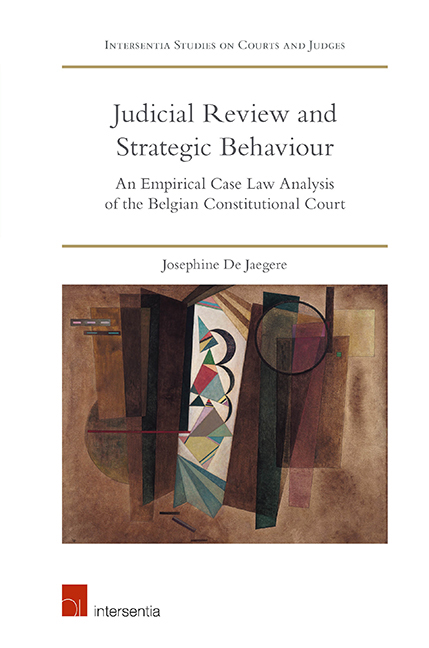 Judicial Review and Strategic Behaviour
Judicial Review and Strategic Behaviour Book contents
- Frontmatter
- Foreword
- Acknowledgements
- Contents
- Introduction
- PART I NORMATIVE FRAMEWORK: THE DELIBERATIVE PERFORMANCE OF CONSTITUTIONAL COURTS
- PART II THE CONTOURS OF JUDICIAL DECISION-MAKING
- PART III EMPIRICAL ANALYSIS OF THE BELGIAN CONSTITUTIONAL COURT'S CASE LAW
- Conclusion
- Codebook
- Bibliography
- Index
- About The Author
PART I - NORMATIVE FRAMEWORK: THE DELIBERATIVE PERFORMANCE OF CONSTITUTIONAL COURTS
Published online by Cambridge University Press: 26 June 2019
- Frontmatter
- Foreword
- Acknowledgements
- Contents
- Introduction
- PART I NORMATIVE FRAMEWORK: THE DELIBERATIVE PERFORMANCE OF CONSTITUTIONAL COURTS
- PART II THE CONTOURS OF JUDICIAL DECISION-MAKING
- PART III EMPIRICAL ANALYSIS OF THE BELGIAN CONSTITUTIONAL COURT'S CASE LAW
- Conclusion
- Codebook
- Bibliography
- Index
- About The Author
Summary
The first part of this book builds a normative framework based on insights from deliberative theory. It is argued that, although the aggregation of viewpoints through and after recurring elections is necessary, this electoral component may not guarantee the quality or legitimacy of policy-making. Therefore, a deliberative component should be added, defined by the concepts of inclusion, transparency and the reasoned exchange of diverging viewpoints. Essentially, the deliberative component should be understood as an ongoing dialogue between various institutions, centred on producing high quality outcomes.
In order to assess deliberative performance, this book introduces a multi-dimensional definition. In particular, a deliberative institution should: (1) provide an inclusive forum; (2) deliberate internally; (3) produce a transparent written decision; (4) justify that decision by rational arguments; and (5) enhance constitutional dialogue.
The question is raised as to which institution(s) are capable of enhancing the deliberative component of democratic policy-making. As such, this chapter begins by discussing the democratic credentials of a (super) majoritarian decision-making process. The legislative process – maybe even more so in a consociational system such as the Belgian polity – can be criticised for a lack of inclusiveness, transparency and rationality, which are the very elements that define the deliberative concept. The central argument in this chapter is therefore that constitutional courts can provide an ex post alternative route to enhance the deliberative component of democratic policy-making. For each key ingredient of deliberative performance, a selection of ‘judicial good practices’ are highlighted, such as citing relevant and persuasive authorities, structuring the decision on the four-stage proportionality analysis, and communicating through constructive case outcomes. These good practices generate fresh considerations for the legislator to take into account when drafting new proposals. In that sense, deliberative theory helps to overcome the counter-majoritarian objections against constitutional review because of the potential for courts to remedy malfunctions in the representative system.
- Type
- Chapter
- Information
- Judicial Review and Strategic BehaviourAn Empirical Case Law Analysis of the Belgian Constitutional Court, pp. 11 - 12Publisher: IntersentiaPrint publication year: 2019


